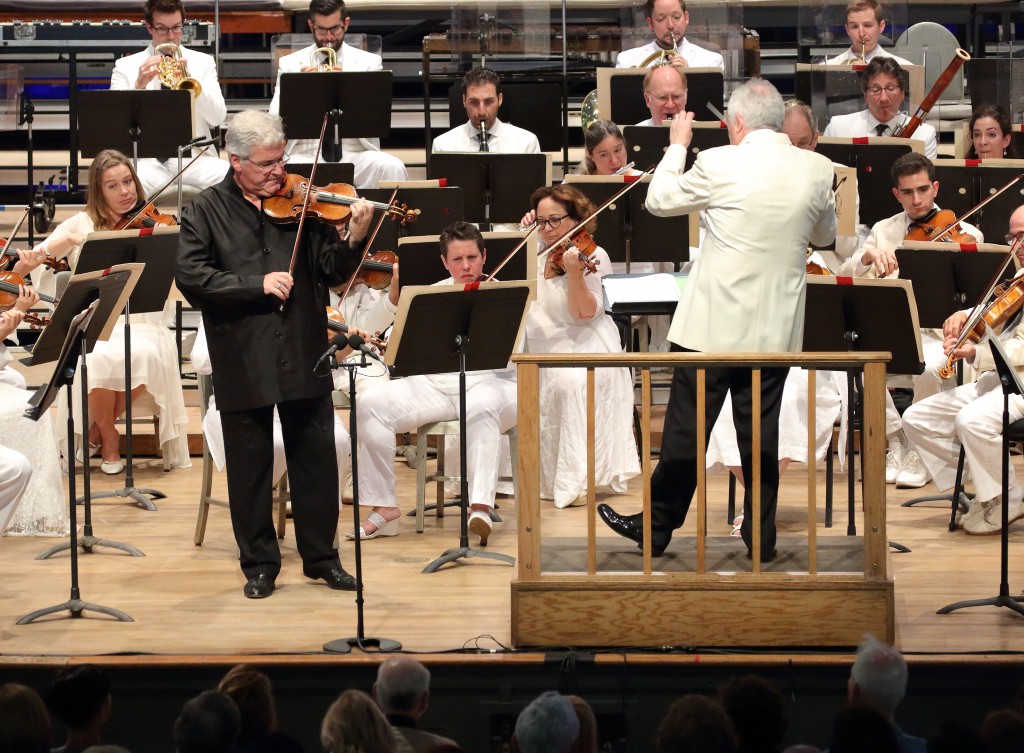Walton rarity and Zukerman’s Beethoven spark Tovey’s Tanglewood program

Pinchas Zukerman performed Beethoven’s Violin Concerto with Bramwell Tovey leading the Boston Symphony Orchestra Sunday at Tanglewood. Photo: Hilary Scott
A sunny Sunday afternoon drew a throng to Tanglewood for the appearance of beloved violinist Pinchas Zukerman. Zukerman did not disappoint, delivering one of his best performances in recent seasons, and the revival of one of the great 20th century choral works in a superb performance took the concert’s special honors. The versatile British conductor Bramwell Tovey displayed equal adeptness in the classicism of Beethoven and the wild rhythms and luminous melismas of William Walton.
Zukerman is a long-acknowledged master of the violin but he can be a frustrating player. His music-making can be objective to the degree of coldness and he has been known to phone in performances of standard repertoire works.
None of that was evident in the Koussevitzky Music Shed on Sunday. Beethoven’s Violin Concerto is a score Zukerman must have played hundreds of times. Yet his patrician reading exceeded his standard personal best. From the first phrases at the violin’s entrance, his warm, rounded sound was distinctive and unmistakable. Zukerman’s technique remains nearly pristine, seemingly undiminished by time in a career that has now spanned half a century.
Following the musical path of Tovey’s broadly paced introduction, Zukerman’s reading was more lyrical than fiery but the virtuosic passages were dispatched with sinew, his tone silken and clear. In a near-perfect collaboration with Tovey, dynamics were nuanced and finely varied and balances between soloist and orchestra were expertly coordinated. The familiar Fritz Kreisler cadenza was assayed with a dash of devilish panache.
Taking a slow tempo in the Larghetto, Zukerman maintained a singing line without plodding. The final Allegro was brisk and gracefully shaped in long melodic arcs. Maintaining tension through the final bars, Zukerman and Tovey delivered a freshly conceived, memorable performance. For once the lengthy ovation and cheers that followed the performance were greatly deserved.
William Walton was once a frequently programmed and highly regarded composer but his works seemed to have fallen off the radar outside of his native England. For sheer sophistication and ingenuity, his 1931 mini-oratorio Belshazzar’s Feast easily exceeds such popular choral staples as Orff’s Carmina Burana.
Recounting the story of the enslavement of the Israelites in ancient Babylon, the feast of King Belshazzar, the handwriting on the wall predicting the monarch’s doom, his death and the fall of his kingdom and freedom for the captives, Walton’s score is dramatic, rousing and brilliantly inventive.
Scored for mixed choir, baritone soloist, orchestra and two brass bands, Walton’s score demands a disciplined and dynamic performance to make its full impact and Tovey delivered just that. As in the previous evening’s performance of Belioz’s Te Deum, the shed proved perfect both spatially and acoustically for this type of large-scale work.
James Burton’s expertly prepared Tanglewood Festival Chorus was the bedrock of the performance. Whether producing soft, poignantly voiced laments of slaves, full throttle bursts of ensemble singing in the “Praise ye” chorus at the feast or radiating the joy of freedom in the final “Alleluia!,” their corporate vocal articulation gleamed. The chorus could turn from massive exuberance to the most delicate pianissimos. The a cappella singing was exquisitely turned.
Ryan Speedo Green brought a deep mellow bass-baritone to the role of the narrator. His enunciation of the text had clarity and strength without hectoring. Green’s vocal range is huge, encompassing the lowest bass notes up to the baritone register. He narrated the prophecy of the handwriting on the wall in rotund, soaring tones.
Tovey maintained expert control over the massive forces and the constant changes of meter, drawing edge of the seat excitement from the BSO. The extra brass players from the Tanglewood Music Center played with accuracy and smooth articulation. Tovey brought fierce drive to the surging rhythms and deep resonance to the pensive theme of the lower strings, later taken up by the narrator. With two harps adding agile figures to the full ensemble, the final triumphant pages were exhilarating.
The Tanglewood Festival continues with pianist Emanuel Ax, cellist Yo-Yo Ma, violinist Colin Jacobson and mezzo-soprano Jamie Barton performing works by Schubert and Jacobson 8 p.m. August 3 at Ozawa Hall. bso.org
Posted in Performances



